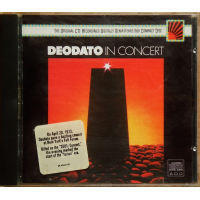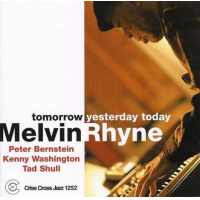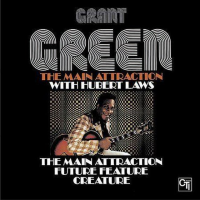Home » Jazz Articles » Liner Notes » Ralph Bowen: Five
Ralph Bowen: Five
The disc at hand is Bowen's fourth album for the label and he returns to the organ combo format that made 2002's Soul Proprietor (Criss 1216) a significant departure and valuable addition to the tenor man's precious catalog. Bowen's muse is an advanced take on the freewheeling implications of John Coltrane's pioneering vernacular. As such, he tackles the framework of the given instrumentation with a fresh outlook that has more to do with the late 60's work of Larry Young than the grits and gravy approach of Jimmy Smith.
Of course, Bowen is no stranger to the range of possibilities inherent in the organ combo. In fact, when talking with this writer in preparation of his previous release, Keep the Change (Criss 1243), Bowen spoke fondly of time spent in Philly working with a number of jazz heavyweights. "I've learned a lot about the organic side of jazz through my experiences with musicians from Philadelphia," Bowen told me at the time. "I started playing at Ortlieb's and got to play with Shirley Scott and Mickey Roker and a whole host of legendary players and so Philly all of a sudden became like a second home to me. People like [organist] Trudy Pitts took me under their wings and I would play with her quite a bit, so that's become a very important part of my development without question."
So when the time came to talk with producer Gerry Teekens about this new endeavor, both men decided an update to the organ format utilized on Soul Proprietor would be a sagacious choice. "Gerry and I threw ideas around and he had a hankering to do this kind of thing again because he liked the last album," says Ralph. "It was fine by me because I love working with organ. I mean, who wouldn't enjoy working with the likes of Bernstein and Yahel?"
Returning to the fold is trumpeter John Swana, another musician who has been thoroughly documented by Criss Cross, his most recent effort being Bright Moments (Criss 1301). Speaking of the dynamic trumpeter, Bowen says, "I work with Swana a lot and have known him for about 20 years. It has always felt to me that we are able to connect well on a number of levels, rhythmically in particular. It's so easy to play alongside of him."
Also back from Soul Proprietor are guitarist Peter Bernstein and organist Sam Yahel, two men who are held in high regard by their peers thanks to their ability to honor the tradition while simultaneously pushing the envelope in order to further advance the music. As Bowen tells it, "In terms of comping, both Peter and Sam listen constantly and not only play off each other really well, but they're able to comp at the same time without getting in each other's way. They really compliment each other and it goes without saying that they're listening to the soloist as well."
A recent associate of Bowen's, drummer Dana Hall is an up-and-coming talent that we're bound to hear more of in the near future. A world traveler and ethnomusicologist, Hall's calling card includes experience with a plethora of jazz leaders, including Terell Stafford, Branford Marsalis, Horace Silver, Bobby Hutcherson, Maria Schneider, and the Carnegie Hall Jazz Band. He also currently holds a position as assistant professor of jazz at the University of Illinois at Urbana-Champaign. "I met Dana a year ago out in Chicago working with Swana, Jim Trompeter, and Dennis Carroll at the Green Mill," says Bowen. "I felt right from the beginning that we were of the same mind. We end up at the same places in terms of parallel rhythmic figures and what not. It's nothing that's been planned ahead of time, we just seem to find our way on the same wavelength. It's actually uncanny at times and things seem to hook-up in a really special and spontaneous way."
No Bowen date would be complete without a sizable helping of his originals, and those who favor his unique compositional flair will have much to savor here, along with a few hard bop classics and a number from the rock pantheon. As Ralph tells it, "I tried to take a little bit of a different approach to this one. The tunes are less II-V-I based and a couple of them are a little more open harmonically. In other words, I tried to find a couple new avenues to explore."
Joe Henderson's "Step Lightly" comes from the tenor saxophonist's productive Blue Note years and it's a perfect way to launch the session. "Right out of the gate, this tune is an automatic swinger, so it seemed like a good one to do," says Bowen. Speaking of the clever switch to 6/8 towards the end of the theme, Ralph explains, "I didn't try to do anything drastic with it, but I thought that little rhythmic idea would be fun." Bowen's solo is a quintessential model of all the elements that define his distinct and unique voice. He exhibits a fullness of sound throughout the range of his instrument, is very fluid in the construction of his lines, and tells a story by building a solo around moments of tension and release.
Having recorded the original "Gordon" for his teenage son on Keep the Change, Bowen widens his circle of family dedications with "Baby Girl." "That's written for my six-year-old daughter Alexandra," Ralph says. "I hadn't up to this point written a song for her and I figured this would be a good opportunity to write one. Essentially it's a short form with an elongated solo section written in somewhat of a chorale type of format."
Aside from Bernstein's brief statement, it's Bowen who takes center stage for the duration on "First Hiatus," delivering one of the best and most intense solos of the date. In a nutshell, Ralph sums up the tune's construction by stating, "[This one's] really open as far as the solos go because there's really no solo form. It's just a rhythmic figure." As for the title, it references the fact that Bowen took his first sabbatical last fall after having taught at Rutgers since 1990. "It was wonderful because it was a good way to get things started for this recording project."
Still thinking of his vacation we suspect, "Free Time" has nothing to do with music that is free of meter or rhythmic pulse. "The title came after listening to the tune a lot," says Bowen. "It felt to me like a happy and light type of thing. From a harmonic standpoint, I was exploring counterpoint, although the solo changes are just those from 'Giant Steps.'" Taken in waltz time, solos are on tap for everyone on hand, including Hall, who constructs an organic statement chock-full of textural nuance and musicality.
Inspired by time spent working with Horace Silver and Michel Camilo, "Bluz Cruz" comes from the Latin bag, although Bowen readily admits that it's not a genre that he typically explores when writing tunes. "I was thinking of my friend and drummer Adam Cruz, so it's really a play on words," Ralph explains. "Actually, I used to work with this blues band called The Fins and we played on a lot of 'blues cruises' out of Manhattan." Although basically just a blues, Bowen crafts a 44-bar structure built on three cycles through the twelve-bar form, with an eight-bar bridge thrown in for good measure.
Clocking in at nearly 13 minutes in duration, "Drowning Man" might be considered the centerpiece of the album, an iconic number from the U2 catalog that originally appeared on their album War. Says Ralph, "I tip my hat to my lovely wife who has been steadily increasing my knowledge of classic rock. I guess I had a lot of gaping holes in my listening in terms of rock music from the '70s and '80s. So we were sitting around listening to some U2 just to see if there would be a song that might jump out in terms of arranging it for jazz. This particular tune really struck me, as it's quite a complicated and involved composition. In essence, I've managed a downsizing of the original theme and rhythmic intent of the sound. I tried to capsulize what I thought the tune was about and then convert it to this setting."
The precision that Bowen feels he's able to achieve when sharing the front line with Swana and the trumpeter's technical proficiency enticed the saxophonist to tackle Woody Shaw's hard bop classic "Rahsaan's Run." "It's pretty close to the original," Bowen explains. "I've added some harmonizations to the melody, but it's pretty true to the original." That great sense of empathy with Hall, that Bowen alluded to earlier, can be heard near the end as the two swap some eight-bar exchanges.
Thus concludes this new update reporting Bowen's present take on the music, a valuable document considering that they usually come few and far between. Still hovering somewhat below the radar of the average listener, the saxophonist continues to be a viable candidate for talent deserving of wider recognition. Asked to look down the road, Bowen quickly responds, "I'm really trying to do more as a leader, both recording and performing. I've done a lot of work as a sideman, so I hope little by little that I can do more as leader."
Track Listing
Step Lightly; Baby Girl; First Hiatus; Free Time; Blues Cruz; Drowning Man; Rahsaan's Run
Personnel
Ralph Bowen
saxophoneJohn Swana
electronicsPeter Bernstein
guitarSam Yahel
organ, Hammond B3Dana Hall
drumsAlbum information
Title: Five | Year Released: 2008 | Record Label: Criss Cross
Tags
PREVIOUS / NEXT
Support All About Jazz
 All About Jazz has been a pillar of jazz since 1995, championing it as an art form and, more importantly, supporting the musicians who make it. Our enduring commitment has made "AAJ" one of the most culturally important websites of its kind, read by hundreds of thousands of fans, musicians and industry figures every month.
All About Jazz has been a pillar of jazz since 1995, championing it as an art form and, more importantly, supporting the musicians who make it. Our enduring commitment has made "AAJ" one of the most culturally important websites of its kind, read by hundreds of thousands of fans, musicians and industry figures every month.

























